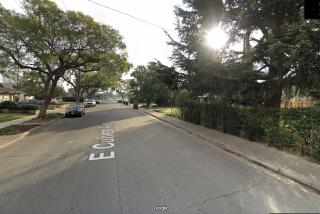Colonel Guilty in Murder of Anthropologist
- Share via
BOGOTA, Colombia — One Guatemalan military officer was convicted and two others were cleared Thursday of ordering the murder of an anthropologist more than a decade ago, the first time a high-ranking officer has been found guilty of a political crime committed during the country’s brutal civil war.
Col. Juan Valencia Osorio, a retired Guatemalan military officer who was a member of an elite presidential guard unit frequently accused of human rights violations, was found guilty by a panel of judges of ordering the assassination of Myrna Mack outside her Guatemala City office Sept. 11, 1990. He was sentenced to 30 years in prison.
Gen. Edgar Augusto Godoy, who directed the infamous unit, and Col. Juan Guillermo Oliva, also a member, were found not guilty in the murder. Both men are retired.
At the time of her murder, Mack, 39, had just published a study on the millions of Guatemalans, mostly Maya Indians, who fled military repression during the nation’s civil war, which ended in 1996 after 36 years.
The case was a small step forward for justice in Latin America, and it was also vindication for Mack’s sister, Helen, who spent 12 years pursuing her sibling’s killers.
An army sergeant was found guilty in 1993 of stabbing Mack to death, but Thursday’s decision revealed the depth of the military’s involvement in the killing.
The country’s history was a dominant theme during the trial, which riveted a nation still trying to come to grips with its violent past.
“I believe this is a victory for Guatemala,” Helen Mack said. “For the first time, we are talking about our recent past in a court of law. And while Guatemalans don’t talk about our recent history, Guatemala is not going to move on, we are not going to be able to enter into a reconciliation process.”
But Valencia’s lawyer said the focus on the past was precisely the problem.
The lawyer blamed the verdict on intense pressure from human rights groups, and promised to appeal.
“This was a totally unjust decision,” lawyer Sergio Castro said. “The problem is that Guatemalans continue confronting each other. They don’t want to leave behind the problems the war left us.”
Human rights groups hailed the decision as a small but significant advance in improving the administration of justice in Guatemala. “The fact that a verdict was reached in the case does represent a first step in the pursuit of justice and accountability in Guatemala,” said Adriana Beltran, the Guatemala specialist for the Washington Office on Latin America, a left-leaning advocacy group. “But we can’t forget that the numerous legal obstacles and the numerous attempts to threaten those involved in the case illustrate the continuing weakness of Guatemala’s justice system.”
Mack’s case became a symbol of the impunity surrounding Guatemala’s civil war, in which, a United Nations report says, the country’s military mounted a campaign that left 200,000 people dead or missing, most of them poor Mayas.
The 1996 peace agreement allowed accused military figures to win amnesty. The failure of democratic reforms and the country’s continued poverty and corruption also have contributed to an ongoing legacy of thwarted justice.
Indeed, Mack’s killers would have gone unpunished if not for the extraordinary efforts of her sister, who formed a human rights group to investigate the murder. Helen Mack reportedly spent $3 million, some of it donated, to pursue the case.
Helen Mack faced enormous odds. Investigators and witnesses were killed. She and her workers were threatened with death. An enormously complicated legal system produced continuous setbacks and delays.
Most challenging, Helen Mack had to crack the secretive ranks of the country’s military, which repeatedly blocked the release of documents and information. The elite guard unit to which Myrna Mack’s killers belonged was supposed to be disbanded after the peace accords, but it still exists.
“This verdict lifts a small corner of the mantle of impunity that has for far too long characterized this and most other human rights violations in Guatemala,” Michael McClintock, director of the Lawyers Committee for Human Rights, said in a statement.
Myrna Mack was one of the first academics to document the effects of the military’s scorched-earth policies against the civilian population. She had just published the first of a two-volume study when she was killed.
A year after her murder, American immigration officials arrested former army Sgt. Noel de Jesus Beteta in Long Beach, where he was working after entering the U.S. illegally shortly after Mack’s murder.
*
Times special correspondent Alex Renderos in San Salvador contributed to this report.
More to Read
Sign up for Essential California
The most important California stories and recommendations in your inbox every morning.
You may occasionally receive promotional content from the Los Angeles Times.










